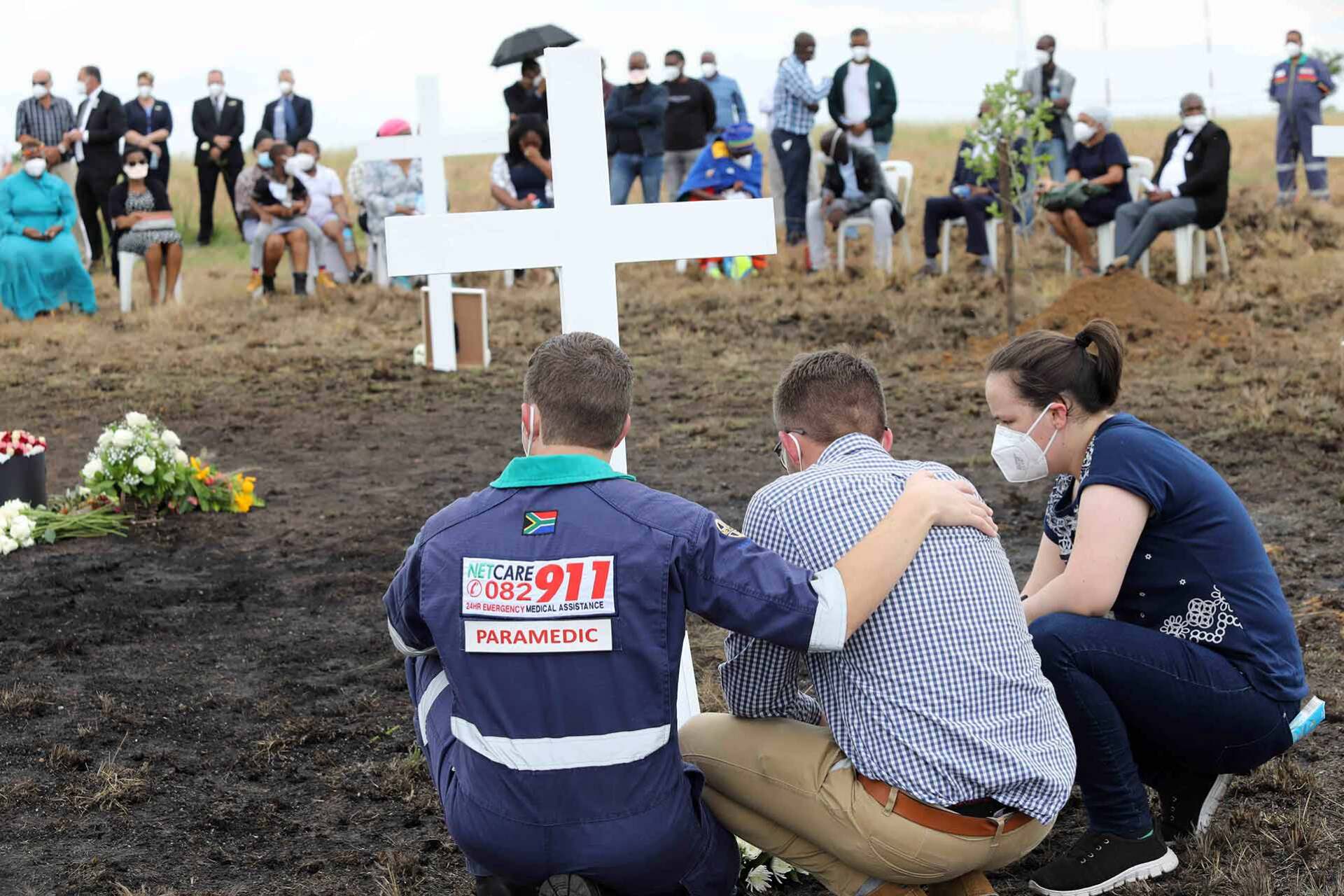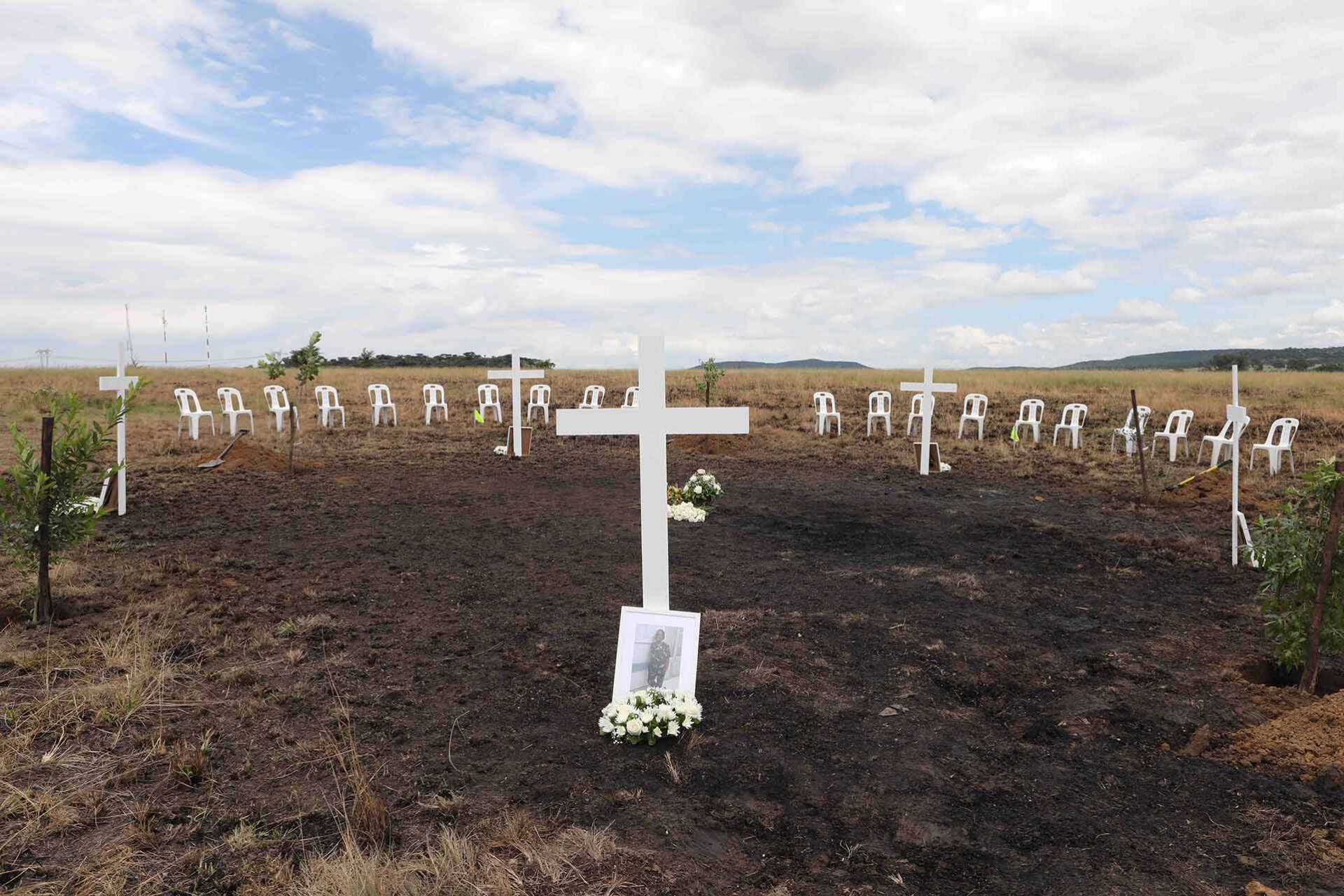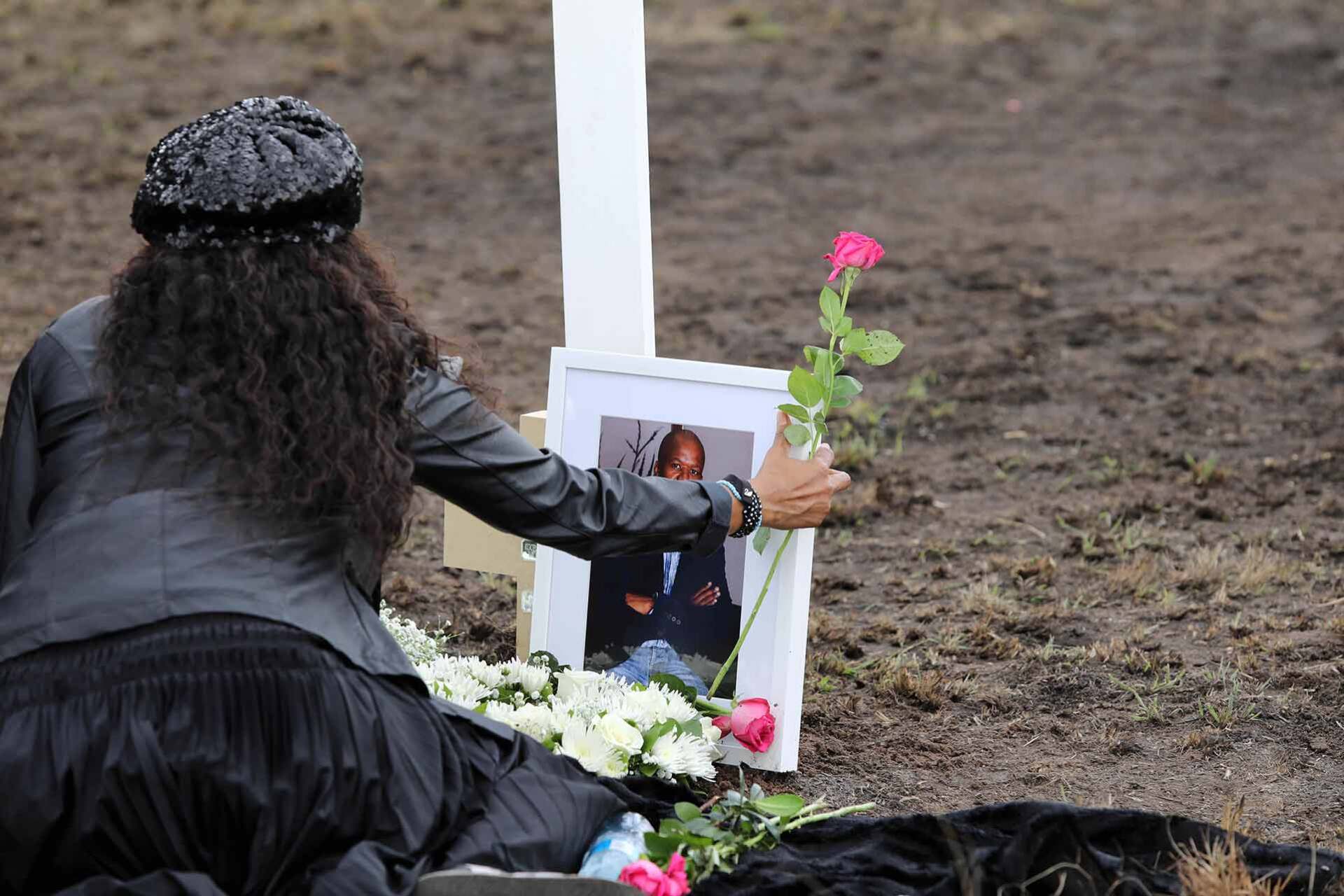A tribute to five remarkable lives cut short
January 28, 2021
Families and colleagues gather at site of helicopter tragedy to honour those who lost their lives
Six painful days punctuated with deep shock and disbelief today culminated in a moving ceremony today for the five extraordinary individuals who lost their lives in a tragic helicopter accident near Winterton in KwaZulu-Natal last week.
It was a long, emotional day for the families, loved ones and colleagues of healthcare heroes Rudolf, Siya, Mpho, Sinjin and pilot Mark. The mourners travelled in convoy from Johannesburg to the crash site in the UThukela District early in the morning.
A cloud-covered day dawned over the city and the Hillbrow Tower was appropriately shrouded in mist as the vehicles made their sombre journey to a remembrance service for the five fallen heroes. Along the route, colleagues from emergency medical services, the South African Police Service and members of the public silently stood vigil as the convoy passed.
In a field, on a farm near Winterton, five white crosses now mark the place where Dr Kgopotso Rudolf Mononyane, Dr Curnick Siyabonga (Siya) Mahlangu, Mpho Xaba, all from Netcare Milpark Hospital, Sinjin Joshua Farrance of Netcare 911 and Mark Stoxreiter from National Airways Corporation (NAC) died in the line of duty.
In paying tribute to his colleagues, Netcare Group CEO, Dr Richard Friedland said, “We are here today to bear testimony to the lives of these great human beings, to continue their unfinished legacy of healing and bringing hope.
“At this hallowed site, their heroic and remarkable lives were cut short and a gaping hole remains. We will never be able to adequately articulate the magnitude of this loss nor make sense of it, and yet we are left with that impossible task as we reach out our arms to you, their loved ones, in hope and comfort.
“These five selfless and extraordinary individuals were on a mercy mission doing G-d’s holy and sacred work, saving lives. This was their calling, their purpose. There is no greater act of humanity than to lose one’s life in attempting to rescue the life of another. We know G-d uses good people to do great things, and we need not look any further than these young, talented, extraordinary individuals who embody what it means to be a hero. Every day for them was an act of courage and they were the personification of strength, compassion and grace.
“Our hearts are broken, we mourn the loss of these fallen heroes, these frontline workers who have given so selflessly, so courageously of themselves. Our hearts are shattered for you, their families, children, loved ones, friends and colleagues whom they have left behind.
“Our thoughts too are with our beloved colleagues at Netcare 911, Netcare Milpark Hospital and NAC. The national outpouring of grief is testimony to the enormous contribution that Mpho, Rudolf, Siyabonga, Sinjin and Mark have made, each in their own unique way,” added Dr Friedland.
Reading from Maya Angelou’s poem, When great trees fall, Craig Grindell, Managing Director of Netcare 911, added his voice to a deeply meaningful and poignant ceremony, attended only by close family members and accompanying colleagues of the deceased.
The programme director for the day was Dr Nceba Ndzwayiba, Group Human Resources Director of Netcare, while the choir of Netcare St Anne’s Hospital performed a poignant musical tribute.
A prayer and words of comfort were provided by Pastor Craig Hounson and Pastor Abraham Masinga, while David Stanton, Head of Clinical and Education of Netcare 911, explained the significance of the five indigenous trees that were planted at the site of the accident.
“These five indigenous trees were planted here as a living memorial to represent the five diverse and loved individuals. They will continue to grow and bloom every season to commemorate their memories and their lives. Trees provide life in many forms, from being a source of food, shelter, oxygen and medicine, as well as being held in many cultures as spiritually important and often revered.
“The ancient symbol of the tree has been found to represent physical and spiritual nourishment, transformation, liberation and union. Trees represent resilience, as a tree bends in the storm just as we weather the daily struggles of life.
“These significant trees will grow here, thriving and providing their shade and nourishment to all those who visit. These trees planted here are real living things, serving as a growing memorial to the lives of our five brave heroes,” said Stanton.
Dr Friedland pledged to the families that Netcare would find a way to ensure that the lives of Mpho, Rudolf, Siyabonga, Sinjin and Mark continue to bring light to this world.
“We will continue to carry you all in our hearts, and we stand here before you steadfast in our commitment to walk in their footsteps, to honour their legacies for you and your children. May they be carried on the wings of angels to their rightful place in heaven. May their beloved souls rest in peace. Hambani Kahle MaQhawe,” concluded Dr Friedland.
Meaning of the trees
These five indigenous trees will be planted here as a living memorial to represent five diverse and loved individuals. They will continue to grow and bloom every season to commemorate their memories and their lives.
Trees provide life in many forms, from being a source of food, shelter, oxygen and medicine, as well as being held in many cultures as spiritually important and often revered. The ancient symbol of the tree has been found to represent physical and spiritual nourishment, transformation, liberation and union. Trees represent resilience, as a tree bends in the storm just as we weather the daily struggles of life.
Umdoni (Waterbessie):
A hardy tree with lush leaves is rich in honey and fruit that attracts bees and wild birds. The bark is known for its medicinal uses.
Wild Olive:
Is believed by the Maasai to be a tree of holiness and solemnity, the olive is also the international symbol of peace.
Umdagane (Birds Eye):
Is believed to have protective powers and is said to ward off bad spirits.
Pambati tree:
Latin name, Integerrima, which means Entire, Undivided and Complete.
Wild Pear:
In ancient times the wild pear was a symbol of divine sustenance, abundance and longevity. The pear fruit has also been seen to represent love and separation.
These significant trees will grow here, thriving and providing their shade and nourishment to all those who visit. These trees planted here are real living things, serving as a growing memorial to the lives of our five brave heroes.

April 11, 2025
Colorectal cancer, one of the most prevalent yet preventable cancers, can develop in the colon or rectum, often starting as small polyps that can quietly become malignant if left unchecked. Dr Mpho Ramabulana, a colorectal surgeon and gastroenterologist at Netcare Akasia Hospital, underscores the life-saving power of vigilance and the importance of early detection.

February 28, 2025
The lives of millions of South Africans with a litany of rare diseases can be vastly improved, and even saved, by addressing challenges in identifying, studying and treating their conditions. With Rare Disease Day on the 28th of February 2025, the Rare Diseases Access Initiative (RDAI) is driving an evolution of the country’s healthcare, through innovative strategies to better care for over 4.2million people living with an estimated 7000 rare diseases. “As our healthcare system faces significant changes in the years ahead, it is vital that we also advocate for people living with rare diseases in South Africa, especially those with limited healthcare access,” said Kelly du Plessis, CEO of Rare Diseases South Africa (RDSA), a member of RDAI. “As part of our ongoing research and awareness efforts, RDAI has conducted an initial analysis of the incidence and prevalence of rare diseases within the country.” This research will assist in improving access to healthcare, policy development, and patient advocacy, while giving critical insight into the challenges faced by patients. “According to research, some rare diseases affect fewer than 1 in a million people, while others, such as Down syndrome, cystic fibrosis, and haemophilia, have a more recognisable prevalence,” says Dr. Helen Malherbe, RDAI lead researcher on rare disease prevalence data. “Many conditions are undetected, underdiagnosed or misdiagnosed, with too many having no information available about them at all.” The RDAI was formed in 2019 to promote a more favourable environment for those impacted by rare diseases in South Africa. Participants include Ampath, the Board of Healthcare Funders (BHF), Discovery Health, Genetic Counsellors South Africa (SASHG), the Government Employees Medical Scheme (GEMS), Health Funders Association (HFA), Medihelp, Medscheme, North-West University (NWU), Rare Diseases South Africa (RDSA), the South African Medical Association (SAMA) and The South African Medical Technology Industry Association (SAMED). The Council for Medical Schemes (CMS) participates as an observer. In the same year, Rare Disease International signed a memorandum of understanding with the World Health Organisation leading to an international rare disease policy framework. In 2021, the United Nations General Assembly moved to adopt a resolution recognising 300 million people living with rare diseases worldwide. “A general lack of awareness and delayed diagnosis remain major hurdles for those affected by rare diseases. Policymakers and healthcare stakeholders need to prioritise access to treatment, diagnosis, and support for rare disease patients,” says Bada Pharasi, CEO of IPASA, “Through this initiative, working collaboratively with stakeholders at every level of the healthcare supply chain, we can bring real and meaningful change to those affected, including family members and care givers, through smart and efficient strategies.” The globally agreed definition of a rare disease is any medical condition with a specific pattern of clinical signs, symptoms, and findings that affects fewer than or equal to 1 in 2000 persons in a population. “Most are genetic, and some are inherited and passed down in families,” Malherbe says. “Some affect only the patient’s genetic recipe, while others may be acquired during life due to infection, trauma, or environmental effects. For many, the cause is still unknown. “These conditions mainly affect children, as they are largely incurable and many are life-threatening. Some require specialised and co-ordinated care, some have limited and expensive treatment options, while others have no information or effective treatments at all,” she adds. The RDAI is calling for a patient-centred care model built on equitable access, transparency and efficiency. Naturally, this model calls for the open participation of patients, the healthcare industry, health professionals, and the Government. “The most critical elements are robust diagnosis standards, improved access to treatment, data collection and management, co-ordination of care, measurement of outcomes and ongoing collaborative research,” du Plessis says. “We need to establish rare disease advisory committees, map gaps and opportunities, establish system requirements, create a roadmap and plan a phased implementation with clear timelines.” The RDAI states that these policy development steps would be a start in quantifying the disease burden and defining standards of care. This would be followed by building and strengthening the capacity to facilitate appropriate diagnosis, treatment, continuity and data monitoring. Thoneshan Naidoo, Chief Executive Officer of the Health Funders Association noted that, “We appreciate the unique opportunity provided by RDAI which enables stakeholders across the industry to work together and identify strategies that improve equitable access to the appropriate diagnosis, treatment and healthcare services for rare disease patients, in an affordable and sustainable manner, taking account of the other pressing needs across the healthcare system.” “True innovation in healthcare is only possible through partnerships and joint advocacy efforts that raise awareness and improve access to treatment. Our long-term goal is the development of a rare diseases policy framework and guidelines for coordinated care,” says Pharasi. “Our members are united in the commitment to unlocking improved patient outcomes and improving access to services and robust health needs assessment facilities.” he concludes. About RDAI The Rare Diseases Access Initiative (RDAI) is dedicated to advocating for improved healthcare access, policy development, and patient support for those affected by rare diseases in South Africa. The initiative brings together key healthcare stakeholders, including pharmaceutical associations, funders, genetic specialists, and patient advocacy groups, to drive impactful change. About RDSA Founded in 2013, Rare Diseases South Africa (RDSA) is a non-profit organisation advocating to ensure that people living with rare diseases and congenital disorders experience greater recognition, support, improved health service and better overall quality of life. Started out of personal need following the diagnosis of organisation founder, Kelly du Plessis' son, it became evident that there was a lack of awareness and support for rare diseases in general in South Africa. About IPASA The Innovative Pharmaceutical Association South Africa (IPASA) is a voluntary trade association representing 24 leading pharmaceutical companies committed to research, development, and innovation. Our mission is to drive healthcare advancement by advocating for policies that improve patient access to safe, high-quality, and affordable medicines.













